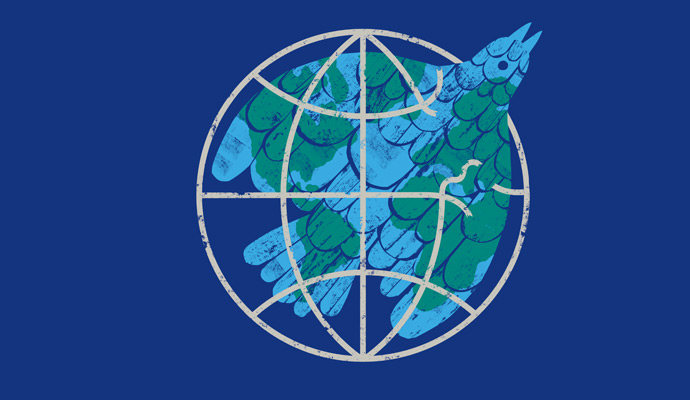Unfit for Public Purpose: The Problem with Institutions Today
A conversation with Ian Bremmer about what it will take for political and economic institutions to regain their credibility. Spoiler: It involves finding new models for solving global-scale problems.
Ian Bremmer is one of today’s more clear-eyed and fluent observers of global trends. He is president and founder of Eurasia Group, a consulting firm that bills itself as “home to the greatest collection of international politics nerds the private sector has ever seen.” A global research professor at New York University, he has published several noteworthy books, including Superpower: Three Choices for America’s Role in the World (Portfolio, 2015). In January, he began a series of conversations with strategy+business editor-in-chief Art Kleiner. In this first talk, they discuss the current crisis of faith in global institutions of all types — political, economic, and media.
KLEINER: The obvious news is obvious. But what are the more subtle stories — the patterns underlying the news that people aren’t seeing as clearly?
BREMMER: There are two big subtle stories today. First, the political and economic institutions in the West, in both the United States and Europe, are starting to erode. They have been incredibly robust and resilient for 50 years, but the world has changed so fast that at some point in recent years, they became less fit for purpose. They’re seen as less legitimate by their own populations. That means that they won’t be seen as effective models globally, and it also means that they’re not working very well for their own people.
For example, consider the U.S. and European news media. You can’t argue that they are as robust as they were 20 years ago, or that they serve the purposes they once did in facilitating global democracy and civic nationalism. They’re “fake news.” They’re divided, politicized, untrusted. Similarly, the proportion of young people in the U.S. and Europe who believe that elections are legitimate and serve their purposes, and that elected officials are legitimate and deserve their respect, is going down. Although Angela Merkel appears to be putting a government together, the anti–European Union forces have already scored a major victory, through the success of the Alternative for Deutschland (AfD) party. Everyone in office in Germany two years ago told me that couldn’t happen.
The erosion has been gradual, so hardly anyone has addressed it. Even now, no one is thinking seriously about the kind of structural reform that would make the social safety net viable, or about infrastructure or trade. That kind of leadership just isn’t there.
KLEINER: If there were a structure that was fit for purpose, what would it look like?
BREMMER: It would look more like the Nordic countries. They’re smaller, they’re homogeneous, and, as a consequence, the social safety net is stronger and the mesh is a lot finer, so fewer people fall through it. There’s much less structural inequality. There’s much more transparency and trust in government and institutions. There’s much more gender equity. There’s no question that they have a real problem with refugees coming in because when countries are homogeneous culturally and ethnographically, refugees may be regarded as more intrusive.
KLEINER: There are no models in larger, more heterogeneous countries?
BREMMER: Some municipalities inside the United States are starting to do this well, but it’s very uneven. You could make the argument that Pittsburgh today is revitalizing itself, for example.
KLEINER: Are we talking about a return to city-states as the focal point of governance?
BREMMER: I’m not sure. The reason I’m not sure is the second big subtle story: a shift in the governance structures related to technology.
You may remember the New Yorker cartoon [by Peter Steiner, published in 1993] with two dogs in front of a computer, where one of them says, “On the Internet, nobody knows you’re a dog.” Twenty-five years ago, that’s how we thought of the Internet. It was empowering individuals to get information, everyone with equal access, and with a benign anonymity.
Today, it’s exactly the opposite. Net neutrality is taking a beating. There’s no equality of access, and there’s no anonymity. Institutions know exactly what kind of a dog you are, where you’ve been, and what you’re up to. This empowers entities with big data — including big governments with a lot of money, if they’re inclined to use it, particularly China — and also big corporations.
If it weren’t for the technological shift to higher levels of social control, I think we could well be heading to a world of city-states and decentralization. But it’s quite possible, given technology, that the Chinese model — using more surveillance and using technology to guide citizen behavior — is a lot more robust than you might like to think. It won’t require political reform because the technology will give the state much more power to segregate and fragment and disenfranchise certain parts of their population.
In the West, the same technology could be used by big corporations to disenfranchise citizens. And if citizens are disenfranchised, structural inequality becomes a chronic condition rather than a crisis.
KLEINER: Why would it be in corporations’ interest to disenfranchise part of the population? Doesn’t business want to have the largest, most diverse, and most enfranchised population possible?
BREMMER: It’s in the companies’ interest to separate individuals so they can be marketed to more effectively as homogeneous, smaller groups. Large groups are heterogeneous, and so it’s extremely expensive to market to them. As a corporation, you want to maximize identity politics. You want to find out exactly how every person is a little bit different, and you want to treat members of different groups very differently because you want different products for them.
That is the exact opposite of what a liberal democracy wants to do, and the antithesis of civic nationalism. The fiduciary responsibility for Facebook is to ensure that every member spends as much time as humanly possible on Facebook and that people click on as much of that platform’s advertising as possible. For the company to do that, it needs to ensure that people see only things they like, and because different people like different things, Facebook has to segment them into like-for-like communities.
Typically, when you have like-for-like communities, members tend to view outgroups as problematic. Now, if there’s a lot of overlap among those groups so that those factions are different only in minor ways, that can be OK. But if the overlap is minimal, so that disparate groups see very different portfolios of content, that’s a real problem.
KLEINER: You’re saying that businesses thrive by giving people what they want, at the expense of the overall quality of life in the larger community. And that this approach to business has reached a tipping point where it’s dangerous.
BREMMER: We’ve had this problem before. Before, say, 2000, when food companies were less affected in the U.S. by regulatory policies, they did everything possible to ensure that people had almost unlimited access to inexpensive sugary, salty, and fatty food. That led directly to a massive obesity crisis. That’s what people “liked.” The companies knew that providing this food was bad for them strategically, at least in the long run, because ultimately people would seek better diets. But it took time to switch. They tried packaging more nutritious food; it didn’t sell as well. It’s their fiduciary responsibility to invest where they can make money in the short run.
Now you have new companies that do the same thing, but in social media and information rather than food. Junk food created obesity. What do you think these companies that are trying to provide information are going to end up doing to our cognitive capabilities?
KLEINER: What strategic guidance can you give leaders of these companies? Do you just say, “Go forth cynically until society collapses around you”? Or is there another way to think about it?
BREMMER: There are three components to any viable solution. The first is more awareness, on the part of the people who run these systems. They are well-meaning individuals in charge of systems that have grown out of control. The institution of social media as a global phenomenon is not even a decade old, and the people who created it have grown up with it.
“Businesses thrive by giving people what they want, at the expense of the overall quality of life in the larger community. And this approach to business has reached a tipping point where it’s dangerous.”
Second, governments need to be much more intrusive in being impartial umpires, arbiters. You can’t have these companies dominating and capturing the regulatory environment. You actually need to have a regulator in the tech space, just as you do for food companies and for cigarette companies. And it’s much harder because the governments are playing catch-up in this field. They’re not particularly sophisticated. They don’t have lawyers with software expertise. It’s more challenging.
Third, as structural inequality grows, we’re going to need non-state actors — NGOs, philanthropists, maybe CEOs or governors acting independently — to create social media models that are not market driven. They may be inefficient, but they’ll nonetheless make a difference.
If you’re asking me whether there’s an easy fix as of 2018, the answer is no. Anything this big and problematic is always hard to fix. It’s like asking about climate change. Identifying the problem is always the first issue, and making it something that people truly see not as a debatable point but as a solid issue. Then you start asking, what constituencies are placed to make a difference, and what can they do?
KLEINER: What these two underlying trends have in common is a lack of models for governance that fit the complexity of the situation. When that level of understanding is missing, any institution that tries to assure the public of its competence is going to fail. Its assurances are “fake trust.”
“Governments need to be much more intrusive in being impartial umpires, arbiters. You can’t have these companies dominating and capturing the regulatory environment.”
And we (the public) have been spoiled. We want it all from our institutions. For instance, in the realm of regulation, we want a model that makes everybody happy — consumers, producers, and government regulators. It should be cheap. It should not be a hassle to comply with, but should gently lead companies to do the right thing. It should prevent toxins from being added to the environment, for instance, and forestall antitrust, but in a way that’s minimally painful for the companies involved. In the social media realm, it should be absolutely convenient and absolutely protective of privacy.
Who would have such a model? Where does such a model exist? Who decides in something like social media where is the person who has the insight to know what Facebook should optimally do?
BREMMER: Yeah. And the people who could get to that answer, on either the government or the technology side, are such a self-selected, homogenized group. They obviously reflect an extremely meritocratic, fairly libertarian, overwhelmingly male, wealthy perspective on the world. Even if they got it right, it would be right only for a very narrow set of perspectives and filters. And it’s unlikely that they’d get it right.
KLEINER: So does the idea of a genuine win-win solution turn out to be philosophically impossible?
BREMMER: I think there are all sorts of win-win solutions, but in this environment they tend to be very small. They’re not big, exciting, structural solutions. We can identify a narrow constituency in a certain geography, with a certain problem, and address that problem.
One fundamental truth about international relations is you can always trust someone to have a really good sense of their own interests. No matter how misguided you think someone is, when you ask them directly about something that really matters to them, they suddenly get really rational. And when the institutions break down, the way you end up getting solutions is by focusing on just a few of those interests, those that are most important to you. You can be fair, direct, and productive in a narrow domain, affecting just a few individuals, businesses, or NGOs. That’s where you’re going to start to see solutions. And some of them will eventually become scalable.




